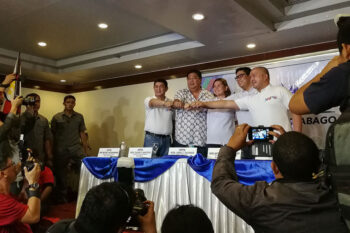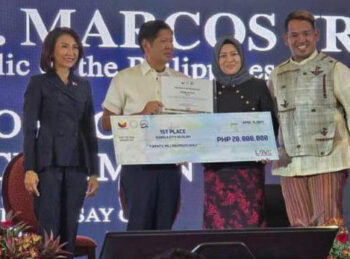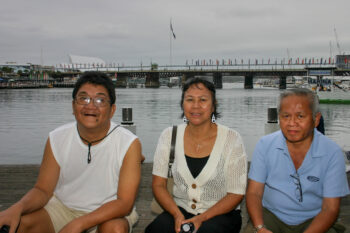
COTABATO CITY (MindaNews /19 August) – These preliminary notes on the Justice System provisions of Republic Act 11054 or the Bangsamoro Organic Law (BOL, Article X) is prompted by queries referred to the author. BOL has created the legal apparatus that applies the prescriptive role of law in which growth points of the Muslim Code is a part of that activity. To carry out this function, the major task is to identify sources of authority and establish Muslim institutions under that authority. Personal law is seen to effect social conditions and modes of organization suitable among discrete parts of the population.
Legal Pluralism
First of all, it will help our readers to provide a broader framework for understanding the concepts of Legal Pluralism. Diverse identity of race, religion and culture can seek to affirm ethnic origin — clans and tribes — when it comes to staking claims of social and political identity adverse to legislative direction in diversity jurisdiction.
For this purpose, I recommend my own journal article: “Legal Pluralism in the Philippines” published in Law & Society Review, Vol. 28. No. 3, Law and Society in Southeast Asia (1994), pp. 461 – 476 (15 pages), published by Wiley. To review the Law of Persons (persona) is to match perspective on the concept of Muslim Personal Law status (condicio) and family relations.
There are various aspects of a person’s status: as an individual, as a member of the community, and as a member of the family. These pertain to the legal position of the human person comprising their rights, capacities and duties. Hence, the law of marriage and family relations are included in this concept both in Roman Laws and Civil Law, and Muslim Laws.
The Spanish Civil Code was extended to the Philippines which owes its origin to the Napoleon Code traced to the Islamic Code in Egypt. The substance of personal law is confined to the family (marriage and divorce), maintenance and property relations, and inheritance (wills and succession) and probate. Personal laws define bodies of law which have given effect to customary law (adat) concerning aspects of property ownership derived from religion and custom with the use of common law principles.
Legal systems and comparative law studies consider, further, the rights and duties pertaining to non-human subjects labelled in contemporary law as “juristic persons”. But, in the eyes of the law, only the natural person is a persona. As a general rule of interpretation the personal law is not “territorial” but follows the “Muslim person” or individual regardless of domicile.
Notwithstanding the expansion of jurisdiction of the Shari’a Circuit Courts (SCC) by BOL, the Supreme Court has general supervision over these courts with judges who are assigned permanent stations in several locations (See SC/AM 92-7-208). SCC judges are given territorial jurisdiction over municipalities which are both covered by the BOL and the Muslim Code (PD 1083).
Query: Given that some SCCs within the BARMM have jurisdiction over municipalities outside BARMM and vice versa, what law governs?
It is in the Court that such questions are answered. And so it is here that the so-called “negative effect” test in which valid ethnic or tribal interest is at issue. The conceptual underpinning of the “consent paradigm” operates at adjudicative authority as well as at regulatory levels. The fourth paragraph of Art. X, Sec. 1 reads:
“Shariah shall apply exclusively to cases involving Muslims. Where a case involves a non-Muslim, Shariah may apply only if the non-Muslims voluntarily submits to the jurisdiction of the Shariah court.” [Note the variance in shariah and shari’a spelling is a matter of transliteration]
The legislative intent introduces a purpose element in order not to “prejudice the rights of non-Muslims and nonindigenous peoples.” Vital social concerns and constitutional infringement at stake here would require amicus briefs that demonstrate the direct effect of adverse ruling in discriminatory case law. As grounds for judicial review — within the contradictory character of diversity jurisdiction — the normative parity of esteem and parity rights practice do not elevate form over substance.
Conflict of Law
Islamic law (shari’a) as a system of court and the right to appeal is broader in context as it pertains to the sources of law of application, construction and interpretation, including jurisprudence (fiqh), procedures and judicial decisions (See Book One, General Provisions of P.D. 1083). The conflict of provision clearly provides:
“Should the conflict be between any provision of this Code and special laws or laws of local application, the latter shall be liberally construed in order to carry out the former” (Paragraph (2) of Art. 3).
The strains of Muslim autonomy laws are evident in several recent cases as well as policies coming from both the legislative and executive branches seemingly for edited constitutional mandate. BOL is not a mere creature of Congress’ statutory policy mandated by the Constitution, but it is an organic act of local application in Muslim Mindanao.
The Civil Code is the general law of application and is the basis for dominant governance set up (i.e., judicial administration) which covers the judicatory power of the Court. To the extent that Muslim Personal Law in judicial decisions is a special category, it is a distinct part of the judicial system. The Constitution protects persons, family and property relations, and thus Bangsamoro justice system is essentially a “contemporary state-building” project.
Presidential Decree No. 1083 or the Code of Muslim Personal Laws of the Philippines, is a statute (i.e. legislation in western form) that has become an integral part of the national legal system. The result of the limitations of Special Shar’ia Courts by accommodation or adaptation is a heritage of colonial legacy. By itself, it is designed to deal with conflict problems within the bounds of the unitary state.
The process of accommodation rests on the fact that the substantive contents both of the Muslim Code and of the Family Code contain foreign elements. The adaptation process includes a body of rules and principles (i.e. private international law) particularly in conflict problems arising from those which deal with the divergence in school of Muslim jurisprudence (madzhab). The complexity is addressed where considerations of domicile are irrelevant in the law of a foreign municipal system, and renvoi doctrine is inapplicable.
Islam in Personal Law
The rules of Islam which concern personal obligation are subjected to modification depending on how much Islamic law is to be recognized by the courts. Constraints upon Islam are therefore creation of the courts, and as such, are not directed against the substance of Islamic law in any way. They arise more out of jurisdictional issues involving secular and religious aspects in which the reality of personal law pertaining to Islamic law proceeds to allow modifications at the initiative of individuals rather than by way of juristic process supporting Islamic principle. This is the rationale for admission to the Special Shari’a Bar under supervision of the SC Bar confidant.
The general enactment on Administration of Muslim Personal Laws is PD 1083. Judges are faced with technical aspects of the operation of Islamic law which will then determine the capacity and eligibility to sit in court. This decree “recognizes the legal system of the Muslims in the Philippines as part of the law of the land and seeks to make Islamic institutions more effective.” The very purpose of codifying Muslim personal laws is to “provide for its effective administration and enforcement” (Para. (b), and (c) of Art. 2).
Jurisdictions and Qualification of Judges
BOL requires membership in the regular Bar as a qualification to be appointed a Shari’a Circuit Court judge. Qualifications of judges under PD 1083 only require Special Bar membership given by the Supreme Court. In short, Sec. 8(a) of Art. X of BOL demands integrated bar credential while Article 152 of the Muslim Code prescribes that judges be counselors of law.
Section 8(a) of Article X of the BOL states that “no person shall be appointed judge of the Shari’ah Circuit Court unless a citizen of the Philippines who is a Muslim, a regular member of the Philippine Bar, at least thirty (30) years of age, must have been engaged in the practice of law for five (5) years or more, and has completed at least two (2) years of Shari’ah or Islamic Jurisprudence.”
Article 152 of the Muslim Code states that “no person shall be appointed judge of the Shari’a Circuit Court unless he is a natural-born citizen of the Philippines, at least twenty-five years of age, and has passed an examination in the Shari’a and Islamic jurisprudence (fiqh) to be given by the Supreme Court for admission to special membership in the Philippine Bar to practice in the Shari’ah Courts.”
Query: Whereas Sec. 8 of Art. X of the BOL requires integrated bar credential (full-fledged lawyer), Article 152 of the Muslim Code requires that judges be counselors of law.
Is this repugnant to the equal protection clause since SCC judges within BARMM are covered, but the same SCC judges who are outside the area of BOL are not required?
It is axiomatic that no courts can operate without judges and practitioners. Stringent qualification for appointment of judges to the Shari’a Circuit bench defeats the very purpose of making the Islamic institutions more effective as a fora for law. If purposeful discrimination is absent, this legal guise only underscores the uncertainty of remedy issues at first instance shari’a courts. Taking a page from BOL, the process is overly burdensome for the ulama, if not heavily politicized to show that it conforms to the Constitution:
“The Supreme Court may grant the incumbent District and Circuit Court judges who are not members of the Philippine Bar a reasonable period within which to qualify pending which they shall be allowed to continue discharging their duties” (Para. (c), Sec. 8)
The question of a unified system of law versus legal pluralism is a judicial policy issue. It may have been pure oversight that BOL modified the qualification of Shari’a Circuit Court judges. Within the purview of the Shari’a Court system, this is not a complete change that could continue to exercise the Shari’a Circuit Courts with judicial uncertainty.
A challenge on equal protection grounds cannot be tested simply on this issue because the legislators have had no need to explain their approach to the Shari’a courthouse. This is what I call a deleterious restriction to nullify the system of diverse sources of law that are normative and guide to the actions of Shari’a courts. Even the competence to determine institutional sources and then decide what relevant sources or proper sources are applicable is derivative. If there are no criteria about criteria “the reasonableness of law” can overcome the deep distrust of the shari’a courts making policy in the legal system.
Judicial System of Personal Laws
The Shari’a Court hierarchy comprises the law-applying institution in a system of diverse sources of law. The Office of the Mufti gives only juristic opinion on non-contested queries. There are two types of jurisdictions: one type of jurisdiction is based on competency to deal with subjects (or case law) in which the Islamic element is present based on Shari’a ruling. The first type of jurisdiction is substantive. Another type is administrative in nature with commonality to civil courts such as enumerated in the Muslim Code as well as those listed in BOL.
Judicial scrutiny of property jointly acquired during coverture (or after divorce) by spouses called harta sa-pancharian is essential whether located in BARMM jurisdiction or situated outside its territory. Apart from amount of claims limit, all claims to sa-pancharian property can be entertained regardless of venue of choice. Analytical implications of the specific provisions are not discussed in this presentation. No impact on account of religious belief if applicability can be shown in respect to distribution of estate is strictly entrenched in BOL. In conclusion, uncertainty and conflict as to the scope of customary law (adat) and Islam still remain, especially in land problems. The query on taazir crimes in BOL will be dealt with separately due to lack of space.
(Datu Michael O. Mastura, President of the Sultan Kudarat Islamic Academy, crafted the Muslim Code of the Philippines and once served as an Amicus Curiae in the Supreme Court. A lawyer and former congressman of the 1st district of Maguindanao, Mastura was a senior member of the peace panel of the Moro Islamic Liberation Front in the negotiations with the Philippine government. The peace talks led to the signing of the Framework Agreement on the Bangsanoro in 2012 and the Comprehensive Agreement on the Bangsamoro in 2014 which paved the way for the creation of the Bangsamoro Autonomous Region in Muslim Mindanao)







